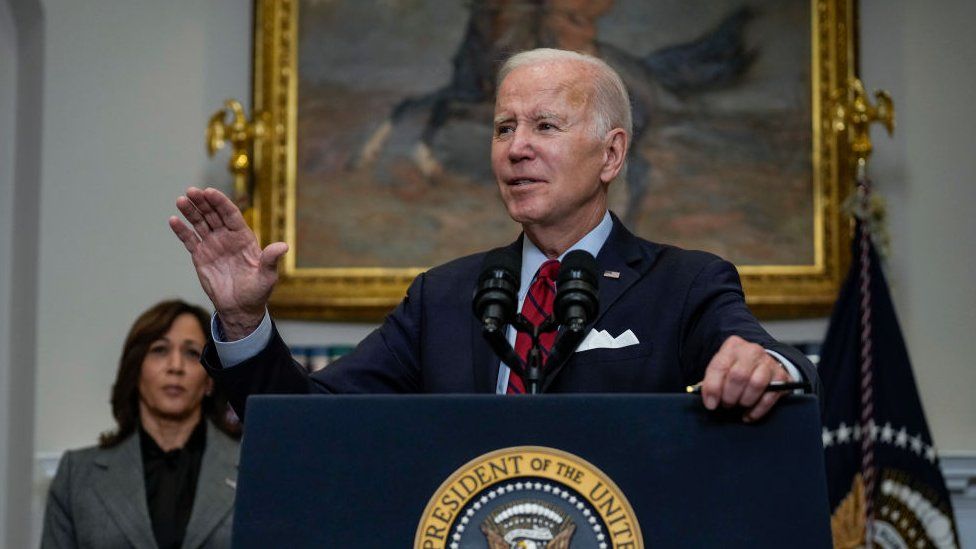ARTICLE AD BOX
 Image source, Getty Images
Image source, Getty Images
By Anthony Zurcher
North America correspondent
The revelation that aides to Joe Biden discovered a handful of classified documents as they were moving boxes out of the president's Washington-based think tank offices has the potential to be a political headache.
It could also place him in legal jeopardy, although too little information is known about the documents - which dated to his time as vice-president before 2017 - and why the were not stored securely at the US National Archives to draw conclusions yet.
A Chicago-based US government attorney, John Lausch, is currently investigating the matter and has already provided a preliminary report to Attorney General Merrick Garland. Details of that report have yet to be made available.
All this hasn't stopped Mr Biden's critics from quickly drawing comparisons between this disclosure, first reported by CBS News, and the ongoing Department of Justice investigation into Donald Trump's handling of classified material following his departure from the White House in January 2021.
"This is further concern that there's a two-tier justice system within the [Department of Justice] with how they treat Republicans versus Democrats - certainly how they treat the former president versus the current president," James Comer, the Republican in charge of the House Oversight Committee, which could launch its own review of the matter, said in a press conference.
Although there is still much to learn about the circumstances around the Biden documents, there are some key differences between the two cases.
The number, type and location of the files
According to news reports, Mr Biden's personal lawyers found 10 classified documents - some marked top secret - included in a box of other material in a storage closet at the University of Pennsylvania's Biden Center for Diplomacy and Global Engagement. That contrasts with the more than 325 classified files - including some marked with Secret and Top Secret designations - discovered over the course of last year at Mr Trump's Mar-a-Lago estate in Florida.
The distinction between Mr Biden's think-tank office and Mr Trump's personal residence could be a notable one, even if it is not entirely surprising given the former president's penchant for mixing business and personal affairs.
The documents discovered in Mr Biden's office were marked "sensitive compartmented information", according to CNN, indicating the material could involve intelligence-gathering methods and sources. They reportedly included information about Ukraine, Iran and the UK.
Of the 300 Trump documents recovered at Mar-a-Lago, one set had a similar SCI designation.
The origins of the investigations
According to Mr Biden's special counsel, his personal lawyers discovered the classified documents as they were moving out of the Biden Center's Washington offices on 2 November. The following day, they turned the material over to the National Archives.
In Mr Trump's case, the National Archives initiated contact with Mr Trump's office after determining that it did not have possession of some notable records from his presidential term - such as correspondence with North Korea's Kim Jong-un.
The former president's team conducted a review of his Mar-a-Lago storage facilities and provided the government with some material, including classified documents, but archivists did not believe the president's team had been fully co-operative. That set in motion the FBI inquiry that lead to the August raid of the Mar-a-Lago estate and the discovery more than 100 additional documents.
The matter has now been handed over to Justice Department Special Counsel Jack Smith, who is reportedly looking into whether Mr Trump or his team violated federal law by obstructing the document recovery process or destroying government materials.
The response to the missing documents
In the days after the Mar-a-Lago raid, Mr Trump accused the FBI and the Justice Department of pursuing a politically motivated investigation in an effort to prevent him from running for the White House again (a campaign he would subsequently launch in November).
Mr Biden, for his part, said Mr Trump's handling was "totally irresponsible".
Now that the president himself is being accused of mishandling classified information, Mr Trump has quickly gone on the offensive.
"When is the FBI going to raid the many homes of Joe Biden, perhaps even the White House?" he posted on his social media site.
Mr Biden himself has not commented on the recent revelations, although his attorney released a statement.
"Since that discovery, the president's personal attorneys have co-operated with the Archives and the Department of Justice in a process to ensure that any Obama-Biden administration records are appropriately in the possession of the Archives," he said.
For the moment, such explanations may suffice. As more details about the Biden documents come out, however, the president himself could have to offer his own explanation.

 2 years ago
46
2 years ago
46








 English (US) ·
English (US) ·